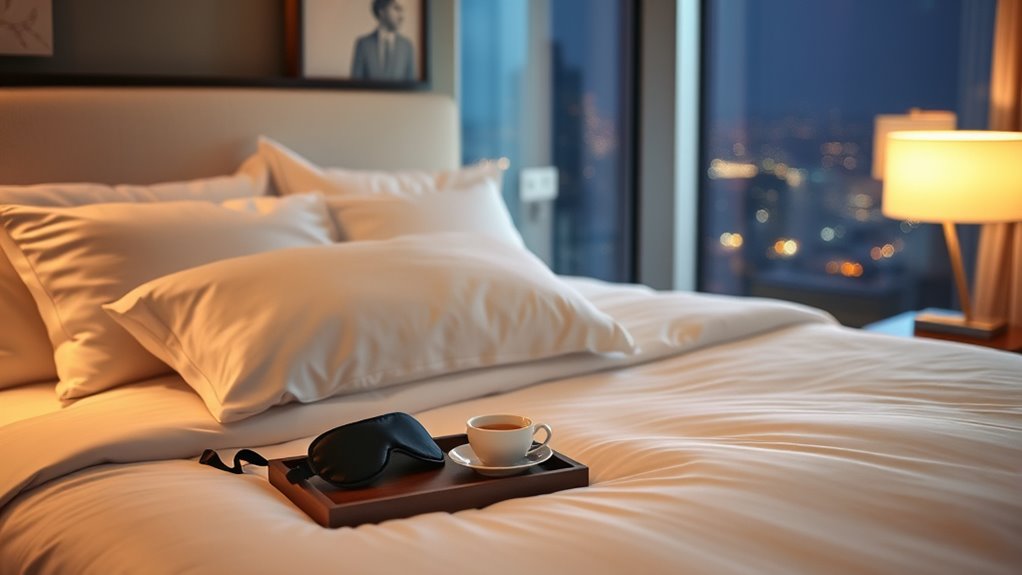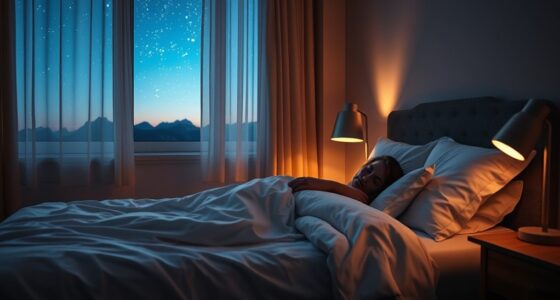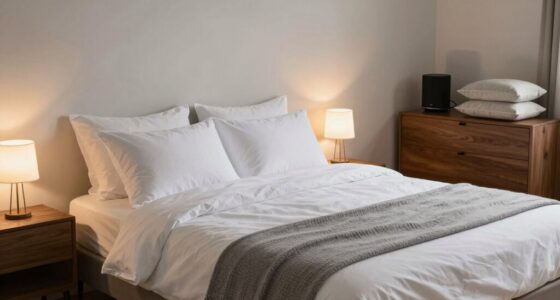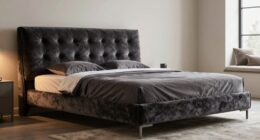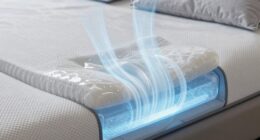To manage sleep during travel, stick to consistent routines as much as possible and create a cozy, familiar environment in your hotel by using blackout curtains, earplugs, or white noise. Avoid screens and caffeine before bed, and choose lighter meals to prevent disruptions. Exposing yourself to natural light helps reset your internal clock. Implementing these tips can ease jet lag and hotel sleep issues—keep going for more effective strategies you can try.
Key Takeaways
- Maintain a consistent sleep schedule and pre-travel routine to help regulate your internal clock.
- Use sleep aids like eye masks, earplugs, or white noise to create a comfortable sleeping environment.
- Limit caffeine, heavy meals, and alcohol near bedtime to promote restful sleep and reduce disruptions.
- Maximize natural light exposure during the day to reset your circadian rhythm effectively.
- Establish a calming pre-sleep routine and adjust room temperature for comfort in hotel environments.
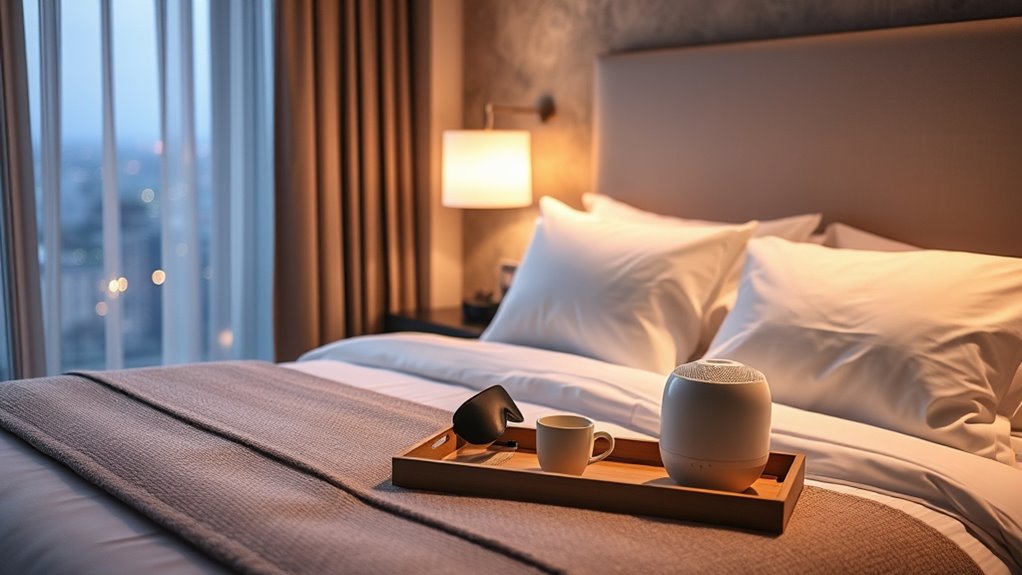
Traveling can disrupt your usual sleep schedule, leaving you tired and groggy upon arrival. When you’re in a new environment, sticking to good sleep hygiene becomes essential to help your body adjust. Sleep hygiene refers to habits and practices that promote restful sleep, so it’s important to establish a routine even on the road. This might include avoiding screens before bed, limiting caffeine intake in the evening, and maintaining a consistent sleep schedule as much as possible. Since travel often throws routines off, integrating these habits can help signal to your body that it’s time to wind down, despite the unfamiliar surroundings.
Maintaining good sleep habits on the road helps your body adjust and stay rested.
Additionally, utilizing the right travel accessories can make a significant difference in maintaining quality sleep. Packing items like a comfortable eye mask, noise-canceling headphones, and a portable white noise machine can help recreate a sense of familiarity and block out disturbances. An eye mask is especially useful if your hotel room has bright lights or if you’re trying to nap during the day. Noise-canceling headphones or earplugs can drown out city sounds, chatter, or other interruptions that keep you awake. A travel pillow can provide neck support during long flights or train rides, reducing discomfort that might interfere with your sleep.
Creating a sleep-friendly environment in your hotel room is also essential. Adjust the room temperature to a comfortable level—ideally on the cooler side, as cooler temperatures tend to promote better sleep. Use your travel accessories to block out light and noise, making the space feel more like your own. If your room is particularly bright, keep the curtains closed or use your eye mask. If sounds are an issue, turn on the white noise app or use your noise-canceling headphones. Bringing along familiar items, like a favorite blanket or pillowcase, can also lend a sense of comfort that encourages sleep.
Sticking to your sleep hygiene practices consistently, even while traveling, helps your body adapt more quickly to new time zones and environments. Avoid heavy meals and alcohol close to bedtime, as they can disturb your sleep cycle. Instead, opt for light snacks and hydration. If you’re dealing with jet lag, try to expose yourself to natural light during the day to help reset your internal clock. Incorporating these strategies and travel accessories into your routine can make managing sleep during travel easier, helping you arrive rested and ready to enjoy your trip. Additionally, understanding somatic therapy techniques can be helpful in managing stress and physical discomfort associated with travel fatigue.

MZOO Luxury Sleep Eye Mask for Side Sleeper Men Women, Zero Eye Pressure 3D Sleeping Mask, Light Blocking Patented Design Night Blindfold, Soft Eye Shade Cover for Travel, Black
Zero Eye Pressure: The Deepest 13mm arc-shaped widened eye cups provide makeup-safe space and allow natural blinking
As an affiliate, we earn on qualifying purchases.
As an affiliate, we earn on qualifying purchases.
Frequently Asked Questions
How Can I Adjust My Sleep Schedule Before Traveling?
To adjust your sleep schedule before traveling, start by gradually shifting your bedtime and wake time closer to your destination’s time zone. Create a sleep environment that’s dark and quiet, and establish calming pre-travel routines like reading or meditation to signal your body it’s time to sleep. These steps help your body adapt ahead of your trip, making jet lag and disruptions less intense when you arrive.
What Are the Best Sleep Aids for Jet Lag?
If you struggle with jet lag, you might consider melatonin as a sleep aid option; a traveler in a case study found it helped reset her internal clock. Natural remedies like melatonin are popular for their effectiveness and fewer side effects. Other sleep aid options include over-the-counter supplements or prescription medications, but always consult a healthcare professional first. These options can help you adjust faster and enjoy your trip more fully.
How Do I Manage Sleep Disruptions Caused by Hotel Noise?
To manage hotel noise disruptions, you can use white noise machines or apps to drown out background sounds, helping you fall asleep faster. Wearing a comfortable sleep mask blocks out light and creates a sense of darkness, promoting better rest. Also, consider earplugs for extra noise reduction. Combining these strategies, you’ll create a peaceful sleep environment, making it easier to rest despite the noisy hotel surroundings.
Are There Specific Foods to Promote Better Sleep While Traveling?
Sure, eat your way to better sleep with healthy snacks like almonds or bananas, and sip sleep-promoting drinks such as chamomile tea or warm milk. It’s almost like magic, but really, your body just appreciates a little help winding down. Skip the caffeine and heavy meals, and you’ll find yourself drifting off faster—no jet lag required. Who knew that what you eat could be your secret sleep weapon?
How Can I Recover Quickly From Sleep Deprivation After Travel?
To recover quickly from sleep deprivation after travel, prioritize rest and re-establish a consistent sleep schedule. Limit caffeine consumption late in the day, as it can interfere with your ability to fall asleep. Create a sleep-friendly environment by keeping your room dark, quiet, and at a comfortable temperature. Avoid screens before bed, and try relaxation techniques like deep breathing or reading to help your body adjust and restore your energy efficiently.

MUSICOZY Sleep Headphones Bluetooth 5.4 Headband Sleeping Eye Mask for Mom Women Men Wireless Music Earbuds Earphones for Side Sleepers Built-in HD Speakers Cool Gadgets Unique Gifts
Comfortable & Ergonomic Design: The MUSICOZY Bluetooth Eye Mask combines the benefits of Bluetooth headphones with a sleep…
As an affiliate, we earn on qualifying purchases.
As an affiliate, we earn on qualifying purchases.
Conclusion
To keep your sleep on track during travel, prioritize adjusting to new time zones and creating a comfortable environment. Remember, studies show that travelers who follow good sleep habits recover from jet lag up to 50% faster. So, stay consistent with your routines, stay hydrated, and use sleep aids wisely. By taking these steps, you’ll arrive refreshed and ready to enjoy your trip, making the most of every moment without being exhausted.

Dreamegg Portable Noise Machine for Baby Adult, Features Powerful Battery, 21 Soothing Sound, Noise Canceling for Office & Sleeping, Sound Therapy for Home, Travel, Registry Gift, Classic White
【COMPACT BUT POWERFUL】- D11 Max has more skills. Designed for all things sleep, this sound machine comes with…
As an affiliate, we earn on qualifying purchases.
As an affiliate, we earn on qualifying purchases.

napfun Neck Pillow for Traveling, Upgraded Travel Neck Pillow for Airplane 100% Pure Memory Foam Travel Pillow for Flight Headrest Sleep, Portable Plane Accessories, Light Grey
CHIN SUPPORT TRAVEL NECK PILLOW – This airplane pillow can better wrap your neck and free your chin,…
As an affiliate, we earn on qualifying purchases.
As an affiliate, we earn on qualifying purchases.
